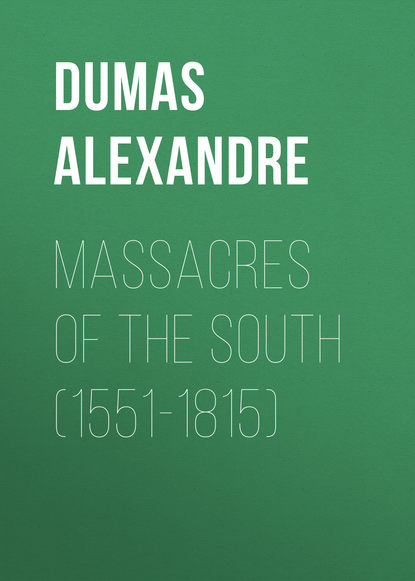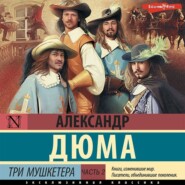По всем вопросам обращайтесь на: info@litportal.ru
(©) 2003-2024.
✖
Massacres of the South (1551-1815)
Настройки чтения
Размер шрифта
Высота строк
Поля
This order, which put everything back upon the footing on which it had been in the time of M. de Montrevel, had hardly been issued than d’Aygaliers, in despair at seeing the result of so much labour destroyed in one day, set off for the mountains to try and find Cavalier. He found him at Cardet, whither, as we have said, he had retired after the day of Calvisson. Despite the resolution which Cavalier had taken never to show his face again to the marechal, the baron repeated to him so many times that M. de Villars was thoroughly convinced that what had happened had not been his fault, he having done everything that he could to prevent it, that the young chief began to feel his self-confidence and courage returning, and hearing that the marachal had expressed himself as very much pleased with his conduct, to which Vincel had borne high testimony, made up his mind to return to Nimes. They left Cardet at once, followed by the forty men who had remained true to Cavalier, ten on horse and thirty on foot, and arrived on the 31st May at Saint-Genies, whither M. de Villars had come to meet them.
The assurances of d’Aygaliers were justified. The marechal received Cavalier as if he were still the chief of a powerful party and able to negotiate with him on terms of equality. At Cavalier’s request, in order to prove to him that he stood as high in his good opinion as ever, the marechal returned once more to gentle methods, and mitigated the severity of his first proclamation by a second, granting an extension of the amnesty:
“The principal chiefs of the rebels, with the greater number of their followers, having surrendered, and having received the king’s pardon, we declare that we give to all those who have taken up arms until next Thursday, the 5th instant inclusive, the opportunity of receiving the like pardon, by surrendering to us at Anduze, or to M. le Marquis de Lalande at Alais, or to M. de Menon at Saint Hippolyte, or to the commandants of Uzes, Nimes, and Lunel. But the fifth day passed, we shall lay a heavy hand on all rebels, pillaging and burning all the places which have given them refuge, provisions, or help of any kind; and that they may not plead ignorance of this proclamation, we order it to be publicly read and posted up in every suitable place.
“MARECHAL DE VILLARS
“At Saint-Genies, the 1st June 1704”
The next day, in order to leave no doubt as to his good intentions, the marechal had the gibbets and scaffolds taken down, which until then had been permanent erections.
At the same time all the Huguenots were ordered to make a last effort to induce the Camisard chiefs to accept the conditions offered them by M. de Villars. The towns of Alais, Anduze, Saint-Jean, Sauve, Saint-Hippolyte, and Lasalle, and the parishes of Cros, Saint-Roman, Manoblet, Saint-Felix, Lacadiere, Cesas, Cambo, Colognac, and Vabre were ordered to send deputies to Durfort to confer as to the best means of bringing about that peace which everyone desired. These deputies wrote at once to M. de Villars to beg him to send them M. d’Aygaliers, and to M. d’Aygaliers to request him to come.
Both consented to do as they were asked, and M. d’Aygaliers arrived at Durfort on the 3rd of June 1704.
The deputies having first thanked him for the trouble which he had taken to serve the common cause during the past year, resolved to divide their assembly into two parts, one of which, was to remain permanently sitting, while the other went to seek Roland and Ravanel to try and obtain a cessation of hostilities. The deputies charged with this task were ordered to make it quite clear to the two chiefs that if they did not accept the proposals made by M. de Villars, the Protestants in general would take up arms and hunt them down, and would cease to supply them with the means of subsistence.
On hearing this, Roland made reply that the deputies were to go back at once to those who sent them, and threatened, should they ever show him their faces again, to fire on them.
This answer put an end to the assembly, the deputies dispersed, and d’Aygaliers returned to the Marechal de Villars to make his report.
Hardly had he done this when a letter from Roland arrived, in which the Camisard chief asked M. de Villars to grant him an interview, such as he had granted to Cavalier. This letter was addressed to d’Aygaliers, who immediately communicated its contents to the marechal, from whom he received orders to set out at once to find Roland and to spare no pains to bring him round.
D’Aygaliers, who was always indefatigable when working for his country, started the same day, and went to a mountain about three-quarters of a league from Anduze, where Roland awaited him. After a conference of two hours, it was agreed that hostages should be exchanged and negotiations entered upon.
Consequently, M. de Villars on his side sent Roland M. de Montrevel, an officer commanding a battalion of marines, and M. de la Maison-Blanche, captain of the Froulay regiment; while Roland in return sent M. de Villars four of his principal officers with the title of plenipotentiaries.
Unskilled in diplomacy as these envoys were, and laughable as they appeared to contemporary historians, they received nevertheless the marechal’s consent to the following conditions:
1. That Cavalier and Roland should each be placed in charge of a regiment serving abroad, and that each of them should be allowed a minister.
2. That all the prisoners should be released and the exiles recalled.
3. That the Protestants should be permitted to leave the kingdom, taking their effects with them.
4. That those Camisards who desired to remain might do so, on giving up their arms.
5. That those who were abroad might return.
6. That no one should be molested on account of his religion provided everyone remained quietly at home.
7. That indemnities should be borne by the whole province, and not exacted specially from the Protestants.
8. That a general amnesty should be granted to all without reserve.
These articles were laid before Roland and Ravanel by d’Aygaliers. Cavalier, who from the day he went back to Nimes had remained in the governor’s suite, asked leave to return with the baron, and was permitted to do so. D’Aygaliers and he set out together in consequence for Anduze, and met Roland and Ravanel about a quarter of a league from the town, waiting to know the result of the negotiations. They were accompanied by MM. de Montbel and de Maison-Blanche, the Catholic hostages.
As soon as Cavalier and Roland met they burst out into recriminations and reproaches, but through the efforts of d’Aygaliers they soon became more friendly, and even embraced on parting.
But Ravanel was made of harder stuff: as soon as he caught sight of Cavalier he called him “traitor,” saying that for his part he would never surrender till the Edict of Nantes was re-enacted; then, having warned them that the governor’s promises were not to be trusted, and having predicted that a day would come when they would regret their too great confidence in him, he left the conference and rejoined his troops, which, with those of Roland, were drawn up on a mountain about three-quarters of a league distant.
The negotiators did not, however, despair. Ravanel had gone away, but Roland had debated with them at some length, so they determined to speak to “the brethren” – that is, to the troops under Roland and Ravanel, whose headquarters at the moment were at Leuzies, in order that they might know exactly what articles had been agreed on between Roland’s envoys and the marechal. Those who made up their minds to take this step were, Cavalier, Roland, Moise, Saint-Paul, Laforet, Maille, and d’Aygaliers. We take the following account of what happened in consequence of this decision from d’Aygaliers’ Memoirs:
“We had no sooner determined on this plan, than, anxious to carry it out, we set off. We followed a narrow mountain path on the face of the cliff which rose up to our right; to our left flowed the Gardon.
“Having gone about a league, we came in sight of the troops, about 3000 strong; an advanced post barred our way.
“Thinking it was placed there in our honour, I was advancing unsuspiciously, when suddenly we found our road cut off by Camisards to right and left, who threw themselves on Roland and forced him in among their troops. Maille and Malplach were dragged from their horses. As to Cavalier, who was somewhat behind, as soon as he saw people coming towards him with uplifted sabres and shouting Traitor! he put spurs to his horse and went off at full gallop, followed by some townspeople from Anduze who had come with us, and who, now that they saw the reception we met with, were ready to die with fear.
“I was too far forward to escape: five or six muskets rested on my breast and a pistol pressed each ear; so I made up my mind to be bold. I told the troopers to fire; I was willing to die in the service of my prince, my country, and my religion, as well as for themselves, whom I was trying to benefit by procuring them the king’s goodwill.
“These words, which I repeated several times in the midst of the greatest uproar, gave them pause.
“They commanded me to retire, as they did not want to kill me. I said I should do nothing of the kind: I was going into the middle of the troops to defend Roland against the charge of treason, or be put to death myself, unless I could convince them that what I had proposed to him and Cavalier was for the good of the country, of our religion, and the brethren; and having thus expostulated at the top of my voice against thirty voices all trying to drown mine for about an hour, I offered to fight the man who had induced them to oppose us.
“At this offer they pointed their muskets at me once more; but Maille, Malplach, and some others threw themselves before me, and although they were unarmed, had enough influence to hinder my being insulted; I was forced, however, to retreat.
“In leaving, I warned them that they were about to bring great misfortunes on the province, whereupon a man named Claris stepped out from among the troops, and approaching me exclaimed, ‘Go on, sir, and God bless you! We know that you mean well, and were the first to be taken in. But go on working for the good of the country, and God will bless you.’”
D’Aygaliers returned to the marechal, who, furious at the turn things had taken, resolved instantly to break off all negotiations and have recourse once more to measures of severity. However, before actually carrying out this determination, he wrote the following letter to the king:
“SIRE, – It is always my glory to execute faithfully your Majesty’s orders, whatever those orders may be; but I should have been able, on many occasions since coming here, to display my zeal for your Majesty’s service in other ways if I had not had to deal with madmen on whom no dependence could be placed. As soon as we were ready to attack them, they offered to submit, but a little later changed their minds again. Nothing could be a greater proof of madness than their hesitation to accept a pardon of which they were unworthy, and which was so generously offered by your Majesty. If they do not soon make up their minds, I shall bring them back to the paths of duty by force, and thus restore this province to that state of peace which has been disturbed by these fools.”
The day after writing this letter to the king, Roland sent Maille to M. de Villars to beg him to wait till Saturday and Sunday the 7th and the 8th June were over, before resorting to severity, that being the end of the truce. He gave him a solemn promise that he would, in the interval, either bring in his troops to the last man, or would himself surrender along with a hundred and fifty followers. The marechal consented to wait till Saturday morning, but as soon as Saturday arrived he gave orders to attack the Camisards, and the next day led a considerable body of troops to Carnoulet, intending to take the Huguenots by surprise, as word had been brought that they were all gathered there. They, however, received intelligence of his plan, and evacuated the village during the night.
The village had to pay dearly for its sin of hospitality; it was pillaged and burnt down: the miquelets even murdered two women whom they found there, and d’Aygaliers failed to obtain any satisfaction for this crime. In this manner M. de Villars kept the fatal promise he had given, and internecine war raged once more.
Furious at having missed the Camisards, de Menon having heard from his scouts that Roland was to sleep next night at the chateau de Prade, went to M. de Villars and asked leave to conduct an expedition against the chief. He was almost sure of taking Roland by surprise, having procured a guide whose knowledge of the country was minute. The marechal gave him carte blanche. In the evening Menon set out with two hundred grenadiers. He had already put three-quarters of the way behind him without being discovered, when an Englishman met them by chance. This man was serving under Roland, but had been visiting his sweetheart in a neighbouring village, and was on his way home when he fell among Menon’s grenadiers. Without a thought for his own safety, he fired off his gun, shouting, “Fly! fly! The royals are upon you!”
The sentinels took up the cry, Roland jumped out of bed, and, without staying for clothes or horse, ran off in his shirt, escaping by a postern gate which opened on the forest just as de Menon entered by another. He found Roland’s bed still warm, and took possession of his clothes, finding in a coat pocket a purse containing thirty-five Louis, and in the stables three superb horses. The Camisards answered this beginning of hostilities by a murder. Four of them, thinking they had reasons for displeasure against one of M. de Baville’s subordinates, named Daude, who was both mayor and magistrate; at Le Vigan, hid in a corn-field which he had to pass on his way back from La Valette, his country place. Their measures were successful: Daude came along just as was expected, and as he had not the slightest suspicion of the impending danger, he continued conversing with M. de Mondardier, a gentleman of the neighbourhood who had asked for the; hand of Daude’s daughter in marriage that very day. Suddenly he found himself surrounded by four men, who, upbraiding him for his exactions and cruelties, shot him twice through the head with a pistol. They offered no violence to M. de Mondardier except to deprive him of his laced hat and sword. The day on which M. de Villars heard of its murder he set a price on the heads of Roland, Ravanel, and Catinat. Still the example set by Cavalier, joined to the resumption of hostilities, was not without influence on the Camisards; every day letters arrived from single troopers offering to lay down their arms, and in one day thirty rebels came in and put themselves into Lalande’s hands, while twenty surrendered to Grandval; these were accorded not only pardon, but received a reward, in hopes that they might be able to induce others to do like them; and on the 15th June eight of the troops which had abandoned Cavalier at Calvisson made submission; while twelve others asked to be allowed to return to their old chief to follow him wherever he went. This request was at once granted: they were sent to Valabregues, where they found forty-two of their old comrades, amongst whom were Duplan and Cavalier’s young brother, who had been ordered there a few days before. As they arrived they were given quarters in the barracks, and received good pay – the chiefs forty sous a day, and the privates ten. So they felt as happy as possible, being well fed and well lodged, and spent their time preaching, praying, and psalm-singing, in season and out of season. All this, says La Baume, was so disagreeable to the inhabitants of the place, who were Catholics, that if they had not been guarded by the king’s soldiers they would have been pitched into the Rhone.
CHAPTER V
Meantime the date of Cavalier’s departure drew near. A town was to be named in which he was to reside at a sufficient distance from the theatre of war to prevent the rebels from depending on him any more; in this town he was to organise his regiment, and as soon as it was complete it was to go, under his command, to Spain, and fight for the king. M. de Villars was still on the same friendly terms with him, treating him, not like a rebel, but according to his new rank in the French army. On the 21st June he told him that he was to get ready to leave the next day, and at the same time he handed him an advance on their future pay – fifty Louis for himself, thirty for Daniel Billard, who had been made lieutenant-colonel in the place of Ravanel, ten for each captain, five for each lieutenant, two for each sergeant, and one for each private. The number of his followers had then reached one hundred and fifty, only sixty of whom were armed. M. de Vassiniac, major in the Fimarcn regiment, accompanied them with fifty dragoons and fifty of the rank and file from Hainault.
All along the road Cavalier and his men met with a courteous reception; at Macon they found orders awaiting them to halt. Cavalier at once wrote to M. de Chamillard to tell him that he had things of importance to communicate to him, and the minister sent a courier of the Cabinet called Lavallee to bring Cavalier to Versailles. This message more than fulfilled all Cavalier’s hopes: he knew that he had been greatly talked about at court, and in spite of his natural modesty the reception he had met with at Times had given him new ideas, if not of his own merit, at least of his own importance. Besides, he felt that his services to the king deserved some recognition.
The way in which Cavalier was received by Chamillard did not disturb these golden dreams: the minister welcomed the young colonel like a man whose worth he appreciated, and told him that the great lords and ladies of the court were not less favourably disposed towards him. The next day Chamillard announced to Cavalier that the king desired to see him, and that he was to keep himself prepared for a summons to court. Two days later, Cavalier received a letter from the minister telling him to be at the palace at four o’clock in the afternoon, and he would place him on the grand staircase, up which the king would pass.
Cavalier put on his handsomest clothes, for the first time in his life perhaps taking trouble with his toilet. He had fine features, to which his extreme youth, his long fair hair, and the gentle expression of his eyes lent much charm. Two years of warfare had given him a martial air; in short, even among the most elegant, he might pass as a beau cavalier.
At three o’clock he reached Versailles, and found Chamillard waiting for him; all the courtiers of every rank were in a state of great excitement, for they had learned that the great Louis had expressed a wish to meet the late Cevenol chief, whose name had been pronounced so loud and so often in the mountains of Languedoc that its echoes had resounded in the halls of Versailles. Cavalier had not been mistaken in thinking that everyone was curious to see him, only as no one yet knew in what light the king regarded him, the courtiers dared not accost him for fear of compromising their dignity; the manner of his reception by His Majesty would regulate the warmth of his reception by everyone else.
Met thus by looks of curiosity and affected silence, the young colonel felt some embarrassment, and this increased when Chamillard, who had accompanied him to his appointed place, left him to rejoin the king. However, in a few moments he did what embarrassed people so often do, hid his shyness under an air of disdain, and, leaning on the balustrade, crossed his legs and played with the feather of his hat.
When half an hour had passed in this manner, a great commotion was heard: Cavalier turned in the direction from which it came, and perceived the king just entering the vestibule. It was the first time he had seen him, but he recognized him at once. Cavalier’s knees knocked together and his face flushed.
The king mounted the stairs step by step with his usual dignity, stopping from time to time to say a word or make a sign with head or hand. Behind him, two steps lower, came Chamillard, moving and stopping as the king moved and stopped, and answering the questions which His Majesty put to him in a respectful but formal and precise manner.

















